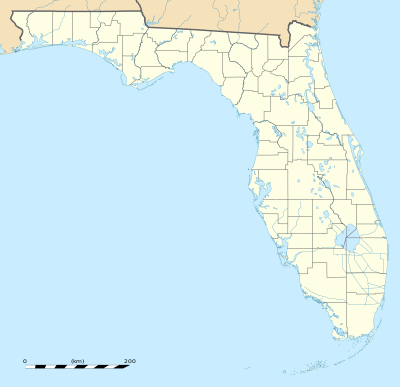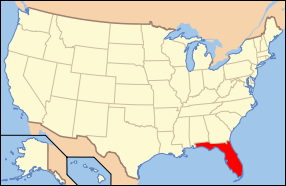St. Augustine Alligator Farm Zoological Park
 | |
| Date opened | May 20, 1893 |
|---|---|
| Location | St. Augustine, Florida, United States |
| Land area | more than 7 acres (28,000 m2) |
| Memberships | AZA[1] |
| Website | |
|
St. Augustine Alligator Farm Historic District | |
  | |
| Location | St. Johns County, Florida |
| Coordinates | 29°52′53″N 81°17′18″W / 29.88139°N 81.28833°WCoordinates: 29°52′53″N 81°17′18″W / 29.88139°N 81.28833°W |
| Built | 1937 |
| NRHP reference # | 92001232[2] |
| Added to NRHP | September 10, 1992 |
The St. Augustine Alligator Farm Zoological Park is one of Florida's oldest continuously running attractions, having opened on May 20, 1893.[3] Not only does it have 24 species of crocodilians, but also a variety of other reptiles, mammals and birds, as well as exhibits, animal performances and educational demonstrations.
History
The park began in 1893 on St. Augustine Beach as a minor attraction at the end of a railway running through neighboring Anastasia Island. The alligators were added at first to get visitors to buy souvenirs and see the museum there. Soon the reptiles themselves became the main point of interest.
Growing in popularity, the park moved to its current location in the early 1920s. The park changed owners in the 1930s, and after a devastating fire they started reconstruction and expansion of the facilities. In 1993, for their 100-year anniversary, the park became the first place in the world to display every species of crocodilian.
As of 2012, this was the only place where one can see every species of alligator, crocodile, caiman and gharial. Over the years the zoo has expanded to include exotic monkeys, birds, and other reptiles. The bird collection alone boasts some species not often seen in other zoos, including hornbills, cassowary, marabou, Cape griffon vultures and Pesquet's parrots. In 2008 the zoo opened a new Komodo dragon facility that also exhibits lizards and snakes found within the range of the saltwater crocodile.
National historic status
On September 10, 1992, the Alligator Farm was designated a U.S. Historic District. As such, it was referred to as the St. Augustine Alligator Farm Historic District. According to the National Register of Historic Places, it covers less than 1 acre (4,000 m2), and contains one building and one structure.[2]
Rookery
The back section of the park contains a large bird rookery, where free-roaming local bird species such as egrets, herons, wood storks and roseate spoonbills nest and rear their young.
Affiliations
The park is a member of the Association of Zoos and Aquariums (AZA)[1] and the Florida Attraction Association.[4]
See also
Notes
- 1 2 "Currently Accredited Zoos and Aquariums". aza.org. AZA. Retrieved 19 March 2011.
- 1 2 "National Register of Historical Places - Florida (FL), St. Johns County". National Register of Historic Places. National Park Service. 2007-03-15.
- ↑ Virtual Views at OldCity.com
- ↑ "Florida Attractions Association". floridaattractions.org. Florida Attractions Association. Retrieved 22 February 2010.
External links
| Wikimedia Commons has media related to St. Augustine Alligator Farm Zoological Park. |

